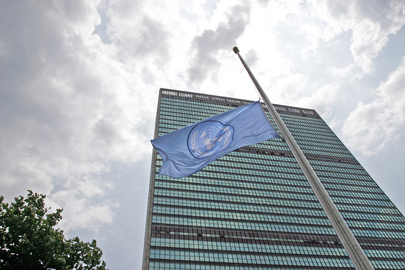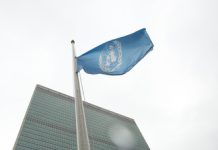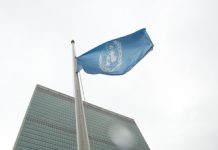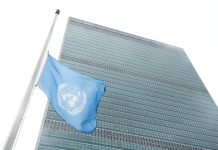This is UN News Today with me Daniel Johnson….the headlines:
The famine risk is real across 14 areas of Sudan as the brutal civil war continues…
The Andaman Sea between Myanmar and Thailand has become one of the deadliest zones for migrants, the Human Rights Council hears…
And…
Hitting the accelerator when you meant to brake? Road safety experts wheel in a fix for so-called “pedal error”.
Famine risk is real for 14 areas of Sudan amid ongoing fighting
But first, the risk of widespread famine in Sudan caused by the heavy fighting there, was confirmed on Thursday by leading hunger experts who warned that the country faces “the worst levels of acute food insecurity ever recorded”.
No less than 14 areas are at the highest level of risk, according to the latest UN-backed Integrated Food Security Phase Classification (IPC) initiative.
Its assessment found that over half the population in Sudan – 25.6 million people – face “crisis or worse” conditions between now and September – which coincides with the lean season.
Of that number, 755,000 also face “catastrophic” food insecurity in 10 states, including the five states of Greater Darfur, as well as South and North Kordofan, Blue Nile, Al Jazirah and Khartoum.
Famine threatens residents, people uprooted by the war and refugees in areas covering Greater Darfur, Greater Kordofan, Al Jazirah states and hotspots in Khartoum.
In the more than 14 months since rival militaries the Sudan Armed Forces and the Rapid Support Forces unleashed their heavy weapons arsenals on one another amid rising tensions over a transition to civilian rule, the UN has repeatedly called for a ceasefire, as the country’s capital, Khartoum, became a battleground, and amid fears of atrocities in the Darfurs.
And despite multiple calls for a ceasefire to Generals Abdel-Fattah Burhan – head of the Sudanese military and Mohammed Hamdan Dagalo – head of the Rapid Support Forces – senior UN humanitarians have warned that the situation is only getting worse.
Countries need to step up to protect victims of trafficking, says rights expert
Victims of people-trafficking need more countries to respect international law and protect them, but thousands continue to die along land and sea routes every year, a top independent rights expert said on Thursday.
In her report to the Human Rights Council in Geneva, Special Rapporteur Siobhán Mullally said that the 2018 Global Compact for Safe, Orderly and Regular Migration commits countries – collectively – “to save lives and prevent migrant deaths and injuries through individual or joint search and rescue operations” at sea.
But that hasn’t stopped at least 8,565 people from dying on migration routes worldwide in 2023, “making it the deadliest year on record”, said Ms. Mullally. Slightly more than half the deaths were a result of drowning:
“For victims of trafficking at sea, first and foremost, the right to life must be ensured, as a fundamental and non-derogable human right. States have an obligation to ensure that maritime actors can fulfil their duties towards persons in distress at sea. It is essential, therefore, that maritime actors are fully supported in meeting their search and rescue obligations. Those obligations must be implemented without discrimination or regard to the status of the persons being rescued and, as such, equally apply to victims of trafficking and persons at risk of trafficking.
Ms. Mullally highlighted the critical situation of Rohingya refugees, many of whom are at risk from trafficking at sea, including child refugees.
She said that nearly 4,500 Rohingya embarked on perilous sea journeys in 2023 and 569 were reported dead or missing. Compared with a year earlier, the number of people leaving the shore increased by 21 per cent, while the number of dead or missing rose by 63 per cent.
Road safety gets a boost with new UN fix for ‘pedal error’
Have you ever been driving in your car and pressed the accelerator instead of the brake? It happens more than you might think and it’s a cause of serious accidents that UN road safety experts have found a fix to, they said on Thursday.
Together with manufacturers and governments, the UN Working Party on Automated or Autonomous and Connected Vehicles has adopted a new regulation that prevents unwanted, sudden acceleration, by relying on technology that can detect objects in front and behind vehicles.
Data suggests that older drivers tend to press the wrong pedal more often than younger ones , according to UNECE – the UN agency with overall responsibility for road safety regulations worldwide.
And it said that in Japan, veteran drivers are eight times more likely to press the wrong pedal than younger ones, which prompted Tokyo to propose a draft UN regulation to address the problem.
UNECE also noted that more accidents of this kind can be expected in future, given the expected doubling of the number of people aged 65 or older worldwide by 2050.
The UN agency also cautioned that the global rise in sales of cars with automatic transmission were another factor likely to contribute to more pedal-error accidents.
This assessment is based on crash data from the United Kingdom showing that seven out of eight “pedal misapplication” episodes involve automatics.
The new UN regulation will therefore only apply to automatic passenger vehicles. It is expected to enter into force in June 2025, although this is not a mandatory start date.
Music composed and produced by Joachim Harris. All rights reserved
Source of original article: United Nations (news.un.org). Photo credit: UN. The content of this article does not necessarily reflect the views or opinion of Global Diaspora News (www.globaldiasporanews.com).
To submit your press release: (https://www.globaldiasporanews.com/pr).
To advertise on Global Diaspora News: (www.globaldiasporanews.com/ads).
Sign up to Global Diaspora News newsletter (https://www.globaldiasporanews.com/newsletter/) to start receiving updates and opportunities directly in your email inbox for free.



























